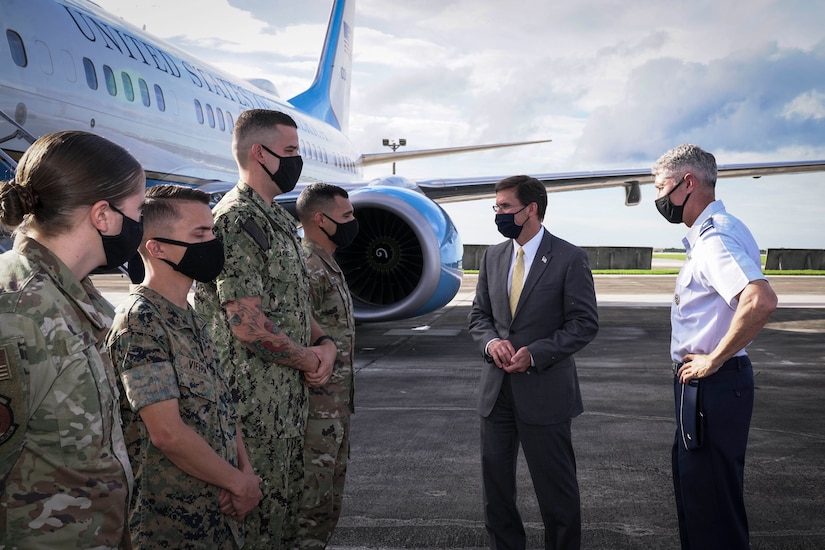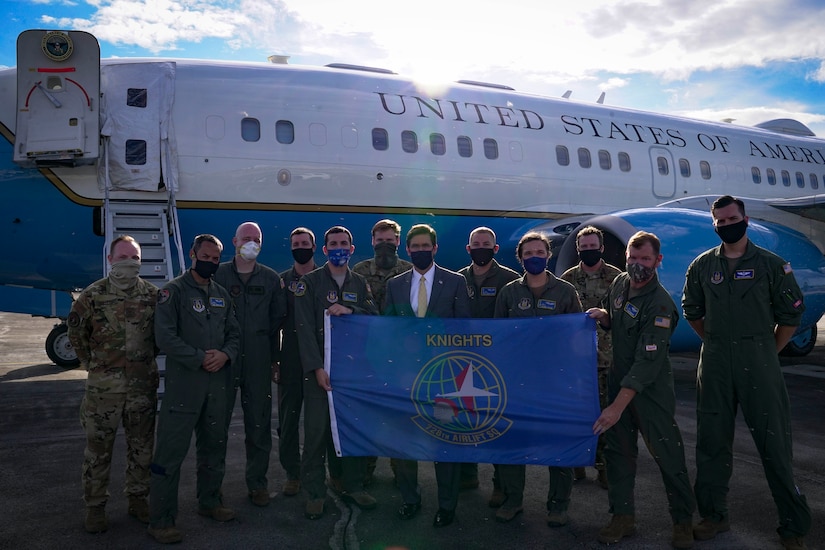Defense Secretary Dr. Mark T. Esper and Japanese Defense Minister
Taro Kono discussed ways to strengthen the already strong U.S.-Japanese
partnership during a meeting at Andersen Air Force Base, Guam.
Japan is a treaty ally of the United States and the Japanese have
been stalwart allies in the Indo-Pacific. Both nations are concerned
with Chinese actions in the region and globally and both nations work
together for a nuclear-free Korean peninsula.
Seventy-five years ago this week, the United States and Japan
laid down their arms against each other and entered into a durable
friendship that has led to tremendous prosperity for our people, and all
the peoples of the Indo-Pacific."
Defense Secretary Dr. Mark T. Esper
In opening statements, both men stressed the need for the United
States and Japan to work more closely together in a post-pandemic world.
Esper asked Kono to pass along his best wishes to Japanese Prime Minister Shinzo Abe, who is stepping down due to poor health.
The meeting comes as the world commemorates the end of World War II.
"Seventy-five years ago this week, the United States and Japan laid
down their arms against each other and entered into a durable friendship
that has led to tremendous prosperity for our people, and all the
peoples of the Indo-Pacific," Esper said.
Both men noted that Japan and the United States share values and
interests in the Indo-Pacific region. Esper said that despite efforts by
some to take advantage of the pandemic to "undermine long-standing
rules and norms, we remain dedicated to preserving a free and open
Indo-Pacific region, working with our partners and our allies, such as
Japan."
Kono noted that in the six months since the men last met face-to-face the world has drastically changed not only because of COVID-19,
"But because there are some attempts to change the status quo by force
and coercion, and some countries are trying to apply cutting-edge
technology to military use. We need to be very carefully monitoring the
situation and we need to build the posture to prevent any attempt to
change the status quo."
Japan is funding a large portion of the move of 5,000 Marines to
Guam. Just before the meeting, Esper toured Camp Blaz on the island
where the Marines will be based. He thanked the Japanese defense
minister for Japan's contribution and for Japan hosting American service
members.
China and specifically the behavior of the Chinese Communist Party,
was a discussion point between the two leaders. "Today, I look forward
to discussing with you China's malign behavior in the region under the
direction of the Chinese Communist Party, including the intimidation and
coercion of its neighbors, and its continued aggression in the East and
South China Seas," Esper said. "We remain steadfast in our opposition
to Beijing's destabilizing activities in the region, which include
attempts to undermine Japan's administration of the Senkaku Islands."
The United States is obligated under the U.S.-Japan Treaty to defend the islands.
Esper and Kono pledged to improve intelligence-sharing arrangements,
and to increase interoperability. Esper thanked Kono for the
participation of two Japanese maritime self-defense force ships in the
Rim of the Pacific exercise currently off the coast of Hawaii.
The two nations also discussed shared development programs including
the co-development of the SM-23A ground-based interceptor missile. Esper
also commented on Japan’s procurement of F-35 aircraft.
North Korea remains a concern to both nations and both are committed
to the "final, fully verified denuclearization of North Korea, to
include all [weapons of mass destruction] and ballistic missile
programs," Esper said.










